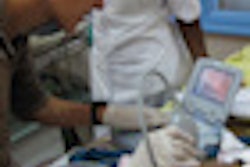None of the four experts who presented the "pro" and "con" sides of commoditization in a debate at the Canadian Association of Radiologists (CAR) 2011 annual meeting earlier this month truly feels positively about this trend.
However, they do agree that radiologists need to do what they can to ensure that procedure reimbursement takes into account the high levels of professionalism among radiologists and the quality of service to the hospitals and communities they serve.
"This is a call to arms to radiologists to make sure that quality is a very important part of what we do," said Dr. Greg Butler, chair of the CAR working group that sets standards of practice for the country. Butler is also a staff radiologist at Valley Regional Hospital in Kentville, Nova Scotia.
Butler, along with Dr. Patrice Bret, chair of the department of medical imaging at the University of Toronto and the University Health Network, was tasked with presenting the benefits of the arrival of commoditization.
"If quality is seen as the primary part of what we provide, then price becomes less important," Butler said. "And commoditization becomes much less of a threat, because people who are doing a good job needn't fear for their futures."
Professional fees include "more than a report," Bret said. Hence radiologists must offer added value, consultations, subspecialization, real-time emergency room final reads/reports, and patient management in multidisciplinary rounds.
"Radiologists are truly 'naked' in front of other specialists, with every report and image displayed for other physicians, and often patients, to look at and frequently criticize. This is a quality differentiator ... that easily identifies the best compared to the mediocre with commoditization," Bret said. "And just as chefs get out of the kitchen to meet their customers, radiologists have to come out of the reporting room and meet the customers, whether they are other physicians or patients."
Dr. Bruce Hillman, a professor of radiology at the University of Virginia in Charlottesville, warned there are far more negative features of commoditization than benefits, and that individual radiologists must work together to fight against both commoditization and corporatization.
"Neither radiologists nor patients benefit from commoditization, which inevitably leads to corporatization," Hillman said. "The principle business of corporations is to enhance the wealth of their shareholders. And while there's nothing wrong with gaining wealth, there is a tendency to cut corners, and hence quality suffers."
Corporatization is already happening apace in Australia, and the prevailing conditions in North America encourage its development, he said. However, individual radiologists can stand firmly in the way of corporatization, by working both through their professional organizations and directly with each other, Hillman said.
"As a 2008 American College of Radiology white paper on the value added by radiologists states, 'The success or failure of the specialty will be the aggregate outcome of how individual responsibility is exercised,' " he concluded.
Dr. Kieran Murphy, vice chair and director of research in the department of medical imaging at the University of Toronto and the University Health Network, represented the "con" side of the commoditization debate with Hillman. He summarized what is at stake by using the quote, 'If you are not at the table, you are on the menu.' "
Radiologists must take steps to ensure their profession is not degraded into a trade by commoditization, he said. This includes strengthening their coalitions with nurses, hospital trustees, and administration. In addition, radiologists must strive to continue their leadership in emerging technologies and therapeutics.
"Trades die because they are not innovating. And the future for radiology is in molecular diagnostics and interventional therapeutic procedures, which are being undertaken by radiation oncologists and other specialists," Murphy noted. "So we need to be heavily involved in the research that is creating the future, or we will become obsolete."



















